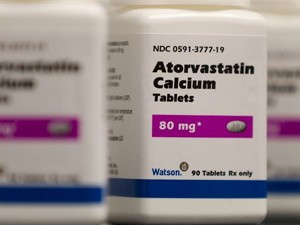Studies find new drugs greatly lower cholesterol

People attend the American College of Cardiology’s conference in Washington, Saturday, March 29, 2014. A new class of experimental medicines can dramatically lower cholesterol, raising hopes of a fresh option for people who can’t tolerate or don’t get enough help from Lipitor and other statin drugs that have been used for this for decades. The first large studies of these drugs were presented Saturday at an American College of Cardiology conference in Washington, and more will follow on Sunday. AP
WASHINGTON — A new class of experimental medicines can dramatically lower cholesterol, raising hopes of a fresh option for people who can’t tolerate or don’t get enough help from Lipitor and other statin drugs that have been used for this for decades.
The first large studies of these drugs were presented Saturday at an American College of Cardiology conference in Washington, and more will follow on Sunday.
Several companies are developing these drugs, which are aimed at 70 million Americans and millions more worldwide who have high LDL or “bad” cholesterol, a major risk for heart disease.
Three studies of Amgen Inc.’s version of these drugs, called evolocumab, found it lowered LDL by 55 to 66 percent from baseline levels compared to others who took a fake drug, and by nearly that much when compared to Merck’s Zetia, another cholesterol medication.
As impressive as that is, it’s still just part of the picture. Doctors want evidence that the way these drugs lower cholesterol also will lead to fewer heart attacks and deaths, because that proof already exists for statins. New studies are underway to test this, but Amgen said it will seek U.S. government approval for its drug this year based on cholesterol-lowering alone.
Article continues after this advertisementThat was enough to win approval for statins and Zetia, but use of Zetia has declined since 2008, when research showed it failed to help prevent heart attacks even though it cut cholesterol. Hopes are high that the new Amgen drug and others like it will do better.
Article continues after this advertisement
This 2011 photo provided by Watson Pharmaceuticals Inc. shows bottles of Atorvastatin Calcium tablets, a generic form of Lipitor which is sold under a deal with Pfizer. Half of Americans ages 40 to 75 and nearly all men over 60 qualify to consider cholesterol-lowering statin drugs under heart disease prevention guidelines issued in November 2013, a new analysis concludes. It was published online Wednesday, March 19, 2014 by the New England Journal of Medicine. AP
“I would be happy to see it approved” on the cholesterol results alone, said Dr. Hadley Wilson, a cardiologist at Carolinas HealthCare System. “We need additional agents other than statins” to help patients, he said.
Nearly all current cholesterol medicines — fibrates, niacin and top-selling statins — are decades old. Statins such as Lipitor, Zocor and Crestor curb cholesterol production. Zetia, which came out about a decade ago, helps block the absorption of cholesterol from the intestine.
The new drugs block PCSK9, a substance that interferes with the liver’s ability to remove cholesterol from the blood.
They have big drawbacks, though. Statins are pills sold as generics for as little as a dime a day. The new drugs are proteins rather than chemicals, and those tend to be very expensive to make. They also must be given as shots every two weeks or once a month. People can give the shots to themselves with a pen-like device. The companies developing the new medicines have not said what they might cost.
“We were very, very pleased” about how well patients accepted the shots, and if they offer better results, especially for those with inherited conditions, “people will accept it,” said Dr. Michael Koren of Jacksonville Center for Clinical Research in Florida, who helped lead two of the studies.
The three Amgen studies involved about 2,000 patients in all. Doctors tested the drug in people with high cholesterol not taking other medicines, as a long-term (one-year) treatment in people already taking various medications and in combination with statins and other drugs in people with an inherited cholesterol disorder.
In general, side-effect rates were about the same for evolocumab vs. placebo or Zetia. In some studies, muscle aches, nausea and a few other problems were a little higher with the experimental drug.
Overall safety “is very, very encouraging,” said Dr. Scott Wasserman, Amgen’s executive medical director.
Researchers also said:
—Alirocumab, a similar drug being developed by Sanofi SA and Regeneron Pharmaceuticals Inc., lowered LDL cholesterol by 47 percent vs. 16 percent for Zetia in a study of about 100 people not taking any other drugs for high cholesterol.
—Bococizumab, from Pfizer Inc., lowered LDL 45 percent to 67 percent, depending on dose, compared to placebo in 354 people with high cholesterol also taking a statin.
“There’s great interest” in all of these drugs, but doctors will wait for evidence that they lower heart risks, said Dr. Neil Stone, a Northwestern University cardiologist and spokesman for the American Heart Association.
It may be easier to justify their use in patients with genes that cause high cholesterol at an early age, he said.
A spokeswoman for the federal Food and Drug Administration, Sandy Walsh, suggested that might be the case.
“Although we cannot comment on the likelihood of approval based solely on specific indications or populations,” two drugs recently were approved based on cholesterol-lowering for people with inherited conditions, she noted.
A decision on approval also will be influenced by how much the drug lowers cholesterol, its effects on other fats in the blood and other heart signs such as inflammation and blood pressure, and its safety, she said.
RELATED STORIES
Drugmaker Ranbaxy halts generic Lipitor production
Retailers sue Pfizer, charge generic Lipitor delay